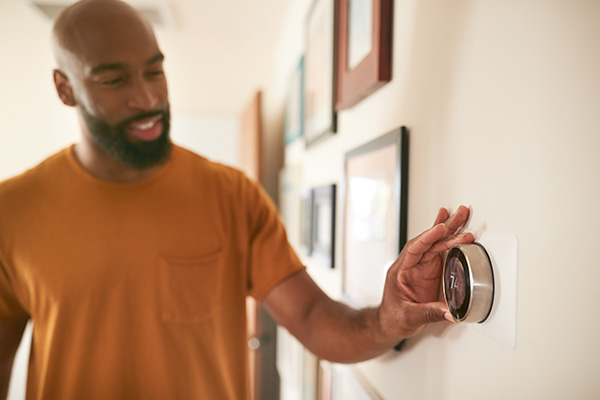Beat the Heat: Summer Cooling Tips

Many Ohioans want to beat the heat during the hot summer months. This fact sheet shares several ways to help keep your home cool and save money on your energy bills when temperatures soar.
Block heat
Prevent the sun from heating your home. These tips can help reduce air conditioning usage:
- Close window coverings during the day; or
- Install a special Low-E “low-emissivity” film to windows; and
- Seal leaks around doors and windows.
Trees planted around the home, especially on the southern and western-facing sides, can also help in the long term.
Manage humidity
Moisture in the home can make it feel warmer. Relative humidity (RH) is a measure of both the air’s moisture and temperature. Hygrometers measure RH, which should ideally be between 30-50 percent in the home. Managing your home’s humidity can make you feel more comfortable and reduce air conditioning usage. Avoid adding moisture to the home when possible. One way is to use exhaust fans for no longer than 20 minutes after cooking or bathing.
Dehumidifiers
Although dehumidifiers remove moisture, they also create heat. You should usually avoid using a dehumidifier in the same room that an air conditioner is operating. To control moisture and reduce the need for a dehumidifier, keep your basement door closed if you have windows open.
Window air conditioners
As with central air, it is important to conduct annual maintenance before each cooling season and clean or replace filters monthly. Refer to the manual for proper maintenance. Turn off or reduce settings when leaving a room. Close the room’s door and keep windows closed to reduce the amount of air that needs cooled.
Heat pumps
Heat pumps draw warm air from the home, releases it outdoors and dehumidifies and cools indoor air. This air is then forced by a fan into the duct system and is circulated throughout the home. Programmable thermostats are generally not recommended for heat pumps. To learn more about heat pumps, visit www.energy.gov/energysaver/heat-and-cool/heat-pumps.
More cooling tips
Try these additional tips to help keep you cool:
- Drink lots of water;
- Wear short-sleeved, loose, light-colored clothing;
- Take cool showers;
- Considering going to a lake or local swimming pool or use a yard sprinkler; and
- Keep cool air from escaping up the chimney by closing fireplace doors or using a chimney balloon or flue plug.
For more energy efficiency tips visit Office of the Ohio Consumers’ Counsel’s and the Department of Energy’s websites at www.occ.ohio.gov and www.energy.gov/energysaver.
To download: Click the folder with a down arrow icon. To print: Click the printer icon in the top right of the display.
If you need multiple copies for an organization or group, please contact a member of our outreach team.
